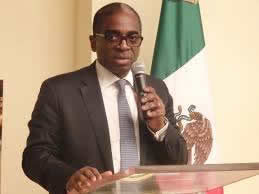The Executive Director and Chief Operating Officer, Nigerian Export Promotion Council, Olusegun Awolowo, said that in line with the Federal Government’s resolve to diversify the economy, the agency had set a long-term target of earning $100bn for the country through non-oil exports.
He said the new plan was to save the country from over-reliance on oil and shore up more fund to the government coffers in the face dwindling revenue occasioned by the fall in global price of crude in the international market.
In a paper titled, “The zero oil plan and an export revolution,’ and delivered during a dialogue between the NEPC and the management of the Development Agenda for Western Nigeria Commission in Ibadan, Awolowo said the council was on a mission to diversify the country’s economy in line with the commitment of President Muhammadu Buhari to change the nation’s economic fortune for the better.
He said, “Nigeria imports thousands of goods worth over $50bn a year, which we pay for mainly with crude oil proceeds. Our fears have now materialised; in the last two years, crude oil prices have fallen by around 60 per cent and Nigeria’s earnings have likewise fallen by at least $35bn, inevitably leaving a financial hole in the economy.
“The pressing question now is how do we fill this funding gap? The answer is simple: Nigeria must quickly find an alternative to oil revenue. If Nigeria broadens and grows its export basket, a positive chain reaction ricochets throughout the economy.
“The logic follows that when you grow exports, national output like agriculture, industry and solid minerals will also grow. Local businesses will grow and supporting infrastructure will expand also. Employment creation and investments will definitely follow suit. The overall macro impacts result in growing foreign reserves and a more resilient economy.
“At the NEPC, we set a long term goal of earning over US$100bn from non-oil exports; that is 20 per cent of today’s Gross Domestic Product…”
Awolowo explained that in implementing the plan, hundreds of thousands of jobs would be created every year from numerous activities of non-oil economy. He also highlighted how NEPC intended to make the plan work.
“The zero oil plan has identified 21 priority countries as markets for Nigerian products, termed and 11 strategic export products with high financial value to replace oil. These include petrochemicals, palm oil, cocoa, soybeans and rubber. To achieve this, Nigeria must scale up domestic production to levels unprecendented and create competitive channels to move cargo and get goods into foreign markets,” he said.
In his response, the Director General, DAWN commission, Dipo Famakinwa, assured Awolowo that the commission was ready to support and partner the council, noting that the NEPC was strategic to diversification of Nigeria’s economy.
Copyright Ships & Ports Ltd. Permission to use quotations from this article is granted subject to appropriate credit given to www.shipsandports.com.ng as the source.

